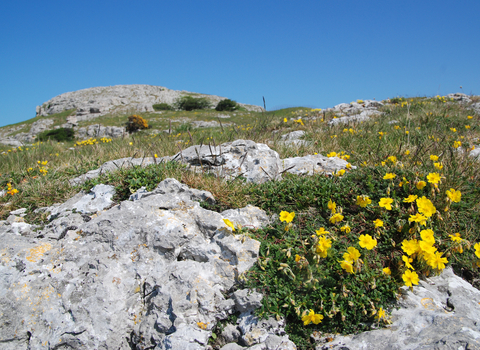Join North Wales Wildlife Trust on an audio trail to discover the coastal gem of the Little Orme (Creigiau Rhiwledyn), a fascinating protected site formed by geology and steeped in history. This headland was once a Neolithic settlement, reshaped by quarrying in the late 1800s, and was used as a coastal artillery practice camp during World War II.
It's now a haven for wonderful wildlife, as spring and summer bring the vibrant displays of limestone grasslands, including delicate orchids and fluttering butterflies. Take in the stunning views from the Little Orme's summit of Llandudno, the Great Orme and out to the Irish Sea.
Know to before you go:
Parking: Parking and toilets are available on Llandudno promenade (To begin the trail, it's a short walk to the entrance of Rhiwledyn Nature Reserve)
Start of trail: Google maps or What3Words: ///snow.agenda.truck
Distance: 3.2Km/2 Miles Duration (including audio): Allow 2.5 hours
Terrain and access: The route includes steep climbs and descents, uneven and slippery surfaces when wet, take caution near unprotected cliff and quarry edges. This trail is suitable for fit and experienced walkers. Sturdy walking boots are essential. OS Explorer Map: OL17.
To begin:
Download the illustrated route map. Starting at Rhiwledyn Nature Reserve, simply scan the QR codes along the trail with your smartphone's camera to listen to the audio clips as you go.
(optional)
Download audio trail script
Download full audio
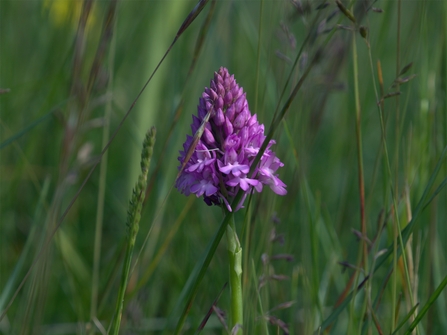
Emerging pyramidal orchid on Rhiwledyn Nature Reserve © Craig Wade NWWT
Directions; Facing the welcome sign, turn right and follow the stone path uphill. You’ll soon reach the third waymark for the North Wales and Wales Coast Path, with a wooden bench on your right- a good resting point to listen to the next audio clip .

View of Rhiwledyn with limestone grassland and common rock-rose ©Lin Cummins NWWT
Continue along the path uphill through the cluster of trees until you reach a wooden kissing gate and reserve’s boundary, your next audio stop.
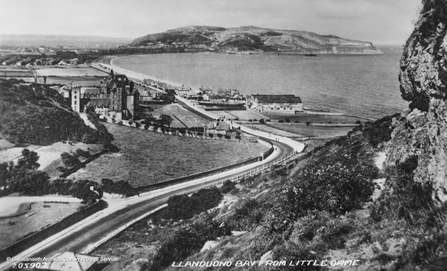
©Gwasanaeth Archifau Conwy Archive Service- Llandudno from the Little Orme c.1920 Craigside Hydro and garage
Continue through the kissing gate along the Wales Coast Path. When you reach a cross junction turn left uphill, following the path until you get a view of Llandudno Bay, turn left uphill when you’ll reach the Trig point. Pause the audio for now, once at the top enjoy the panoramic views and press play to continue listening. (Or play audio clip 4 separately)
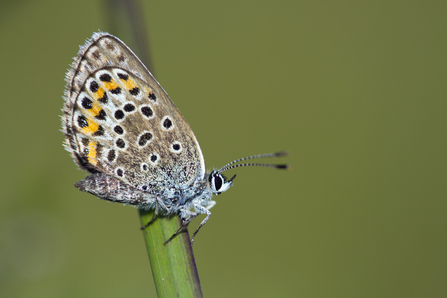
Silver-studded blue (Plebejus argus), New Forest, Hampshire, England, UK ©Guy Edwardes/2020VISION
Retrace your steps back, at the grassy cross junction take a left to pick up the Wales Coast Path waymark. Follow the path until you see Penrhyn Bay and the quarry (careful of the sudden drop off), turn right and continue until you reach the old winding gear. Your next audio stop is found on the kissing gate.
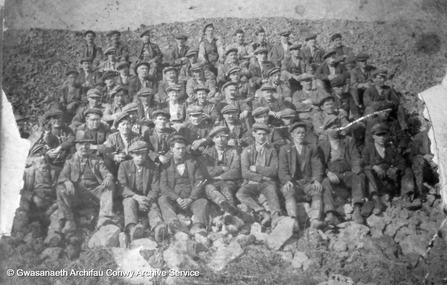
©Gwasanaeth Archifau Conwy Archive Service- Little Orme quarry workers.
Go through the kissing gate down the steep path. Taking care as the gravel track can be slippery. When you reach the bottom bear left towards the exposed limestone rock and Porth Dyniewaid (Angel Bay). Where your next audio point is found on the interpretation panel.
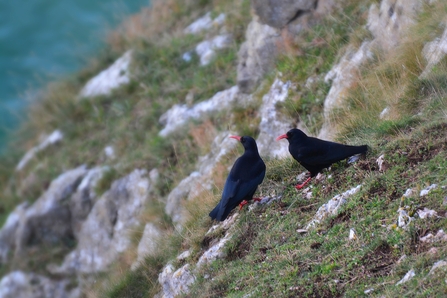
Choughs at Rhiwledyn © Henry Cook
With the interpretation panel behind you, continue ahead to join the meandering gravel path, until you reach a small Wales Coast Path waymark post. Here, storyteller Andy Harrop-Smith shares the tale and local legend of mermaids of the bay.
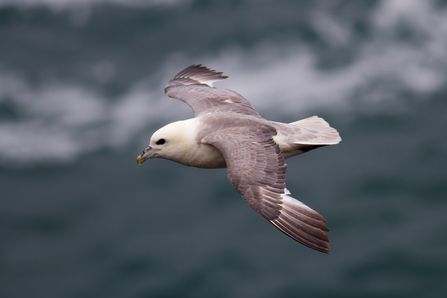
Fulmar in Flight ©Mike Snelle
Continue along the tarmac path, as you approach a left-hand bend, on your right in front of the old quarry cliffs, you’ll see your last audio point on the Wales Coast Path waymark finger post.
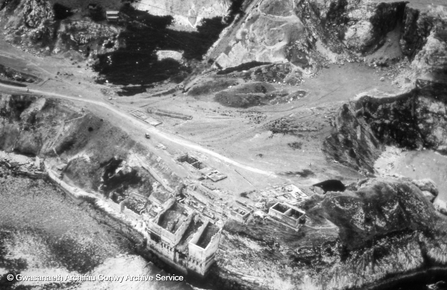
©Gwasanaeth Archifau Conwy Archive Service- Aerial photo showing old quarry buildings and Trwyn y Fuwch
From the tarmac path take the narrow gravel path that curves to the right. Pass through the metal kissing gate and between the houses. Followed by a sharp right hand turn through a wooden kissing gate.
Continue along the tree-lined path uphill to join a lane that leads to Colwyn Road. Turn right to return to the start of the trail.
Also available on the Places and Trails™ app, download for free
Google Play (Android)

®Lottery Heritage Fund in partnership with Welsh Government
This project is funded by the Nature Networks Fund.
It is being delivered by the Heritage Fund, on behalf of the Welsh Government.

